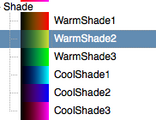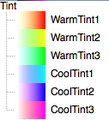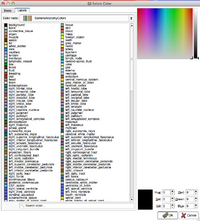Documentation/4.1/SlicerApplication/LookupTables
|
For the latest Slicer documentation, visit the read-the-docs. |
Overview
In Slicer, the simplest and most widespread application of medicine-specific knowledge are the color lookup tables (LUT) that Slicer uses to map the integer values contained in label map images into structure names and colors. We have begun to use this wiki as both a centralized repository for lookup table information as well as a collaborative tool for creating new mappings. The following wiki pages are in a special format that allows conversion into Slicer lookup tables. Slicer offers a variety of predefined lookup tables (LUT). Volumes can be associated with a LUT in the volumes module. Also, see the Colors Module.
LUTs
Freesurfer LUTs
-Freesurfer LabelsLabelmap LUTs
-Brain Labels: Label colors for brain segmentation
-Label Colors: Colors for a generic labelmapGeneric Labelmap LUTs
-Default Generic Anatomy Colors
-Generic Colors
LUTs for Charting
Please see the Generic Chart Colors page.
LUTs in Slicer
You can review and edit LUTs in Slicer via the Colors module.
Slicer ColorPicker
The slicer colorpicker allows to select colors from a label map and to assign them to objects such as surface models or streamlines.
LUTs for Slicer4
- Default Generic Anatomy Colors LUT for Slicer 4.1
- Generic Colors
- Brain Labels: Short Brain LUT for Slicer General Applications
- Label Colors: Short LUT for Slicer General Applications
Brain Atlas LUTs
- 2012 Multi-modality MRI-based Atlas of the Brain: Good example of the wiki-based labelpage format, including multiple tables.
- Tractography Colors: LUT for White Matter Parcellation.
- 2012 SPL Brain Atlas Colors
Custom LUTs
It is relatively easy to create custom LUTs by creating a table with the colors on the wiki. This allows to select specific names and colors when segmenting. See below for an example.
| integer_label | text_label | color | notes |
|---|---|---|---|
| 0 | background | rgba(0,0,0,0) | |
| 1 | tissue | rgb(128,174,128) | Default label for bodily tissues |
| 2 | bone | rgb(241,214,145) | |
| 3 | skin | rgb(177,122,101) | |
| 4 | connective tissue | rgb(111,184,210) |
- Standard color names and values: http://www.w3.org/TR/SVG/types.html#ColorKeywords
- Go here to create a text file in Slicer LUT format.
- A custom LUT can be loaded into Slicer like any other file.
Custom LUT Examples
- Abdominal Atlas Labels
- Head and Neck Atlas Labels
- Head and Neck Muscles Labels
- Female Pelvis Labels
- Freesurfer Labels
- Knee Atlas Labels
- Laura's Labels
- Mori-Atlas Labels
Useful Links
- Converting wiki pages to and from LUTs
- Web-based tools that convert between wiki and Slicer color files can be found at http://labelpage.halle.us/
- Creating custom palettes: http://colorbrewer2.org/







